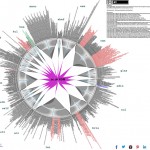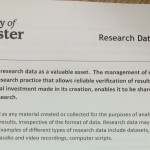Knowledge to broadcast: research archiving blog
Subscribe
Posted by in Knowledge to broadcast: research archiving blog on March 15, 2017

I was checking out a research paper in the ACM Digital Library: SibylFS: formal specification and oracle-based testing for POSIX and real-world file systems and spotted something interesting: a “Concepts in this article” drop-down “Powered by IBM Watson” For more on Watson, see IBM Watson: Beyond Jeopardy! Q&A I’ve been thinking what calls to action a user […]
Posted in Audience workflow | Tagged Leicester Research Archive, Tools, Usability
Posted by in Knowledge to broadcast: research archiving blog on September 6, 2016

There are many words used around Research Data Management and providing a glossary seems like a good idea. A few already exist: http://researchdata.ox.ac.uk/home/glossary/ http://vocab.bris.ac.uk/data/glossary/ http://www.dcc.ac.uk/digital-curation/glossary http://dictionary.casrai.org/Category:Research_Data_Domain and there are OA FAQs: http://www.library.manchester.ac.uk/services-and-support/staff/research/services/open-access-at-manchester/faq/ http://openaccess.ox.ac.uk/home-2/faq/ http://www.imperial.ac.uk/research-and-innovation/support-for-staff/scholarly-communication/open-access/faq/ How do we make it big enough to cover what we want, keep it up to date, point people to […]
Posted in Uncategorized | Tagged Data Management Planning, Data Publication, Digital Preservation, Research Data Management
Posted by in Knowledge to broadcast: research archiving blog on April 7, 2016

I’m starting to work more with Data Management Plans (DMPs) which are required by some funders and might well be a good idea for most researchers anyway. We’re looking at DMPonline by the Digital Curation Centre for creating them and what local customisations we want to make. I’m also starting to look at DMP Rubrics and the […]
Posted in Open data, Uncategorized | Tagged Data Management Planning, Research Data Management, Tools
Posted by in Knowledge to broadcast: research archiving blog on October 14, 2015
More thoughts about the University of Leicester Research Data Management Principles. Research inception and planning 2. Data management planning is an integral, essential and dynamic component of the research process from inception and should include provision for the selective long term custodianship of research data. 3. Research proposals should include all possible recovery of direct […]
Posted in Open data | Tagged Data Management Planning, Data Publication, Digital Preservation, Open Access, Research Data Management
Posted by in Knowledge to broadcast: research archiving blog on October 5, 2015

I’m working on adding more practical advice the underpin the University of Leicester Research Data Management Principles. These start: The University regards research data as a valuable asset. The management of research data is an integral part of good research practice that allows reliable verification of results, protects the intellectual and financial investment made in […]
Posted in Open data, Uncategorized | Tagged Data Publication, Open Scholarship, Research Data Management |
Posted by in Knowledge to broadcast: research archiving blog on June 18, 2015

We want to make the process of depositing, finding, reading and acting on our research as simple and efficient as possible and to remove barriers to access. A good way to improve usability is to watch real users perform real tasks. To do this, we need to pick a few tasks and some sample users. We […]
Posted in Measuring, Researcher workflow | Tagged Accessibility, Usability
Posted by in Knowledge to broadcast: research archiving blog on June 17, 2015

Longer term I feel one of the most important things I do is increase research impact. I also want to celebrate our successes and build goodwill, support and demand for our services. One of the simpler things I can measure is access and readership of our institutional repository Leicester Research Archive (LRA) We use DSpace for […]
Posted in Measuring | Tagged COUNTER, IRUS-UK, Leicester Research Archive, Tools
Posted by in Knowledge to broadcast: research archiving blog on June 8, 2015

You might think that knowing who wrote a research paper would be simple. It isn’t. So? Why does it matter who wrote a paper? I immediately think of recognition, credit (or criticism!) and to read more from the same author. Perhaps we want to contact the author for collaboration or consultancy or to link them […]
Posted in Researcher workflow | Tagged ORCID, Research Publication
Posted by in Knowledge to broadcast: research archiving blog on October 8, 2014

I find tools from SHERPA useful. I like to keep an eye on what I’d ideally like as well as what is currently available both for me and people I work with. In tools to help with Open Access publishing: For researchers: A clear choice between contractual choices for a journal, with a small number […]
Posted in Promoting Open Access, Researcher workflow | Tagged Compliance, Open Access, Publishers, Research Publication, Tools
Posted by in Knowledge to broadcast: research archiving blog on September 1, 2014

In my last post I came up with a bunch of basic rules on Spreading the word – what to do and what not to do. What if I was completely wrong? For ephemeral events, what if people mainly spot intriguing images in a sea of “stuff”? What if some of us are just […]
Posted in Marketing | Tagged Marketing, Usability










Recent Comments